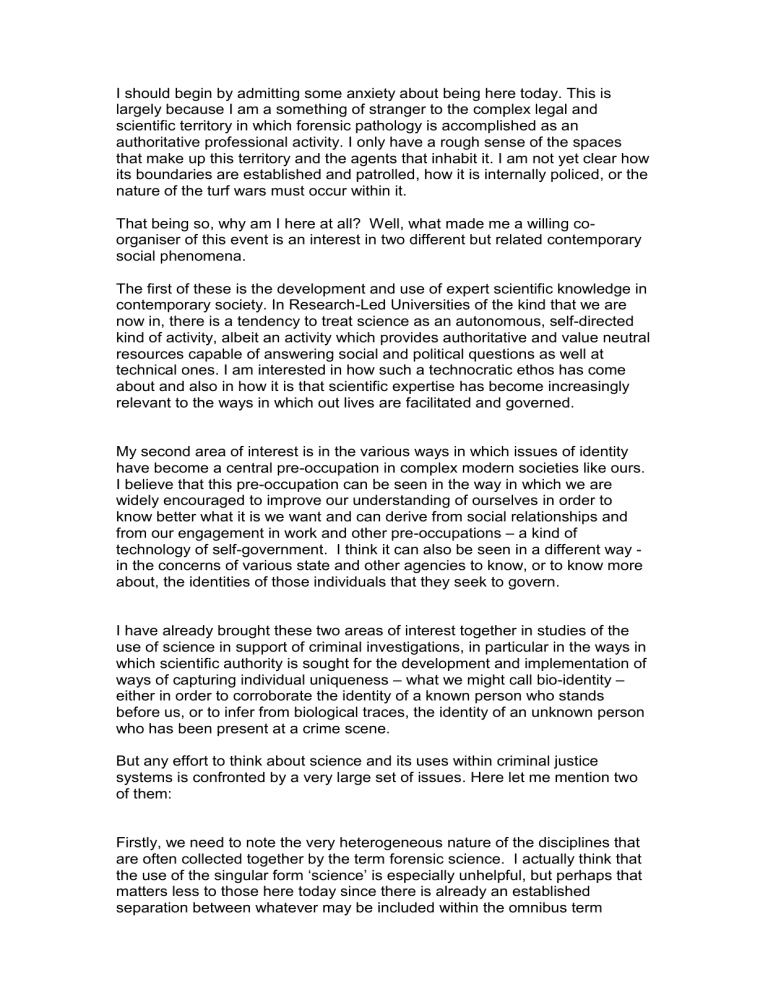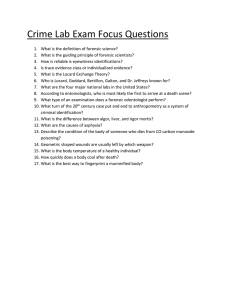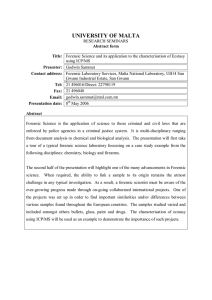I should begin by admitting some anxiety about being here... largely because I am a something of stranger to the...

I should begin by admitting some anxiety about being here today. This is largely because I am a something of stranger to the complex legal and scientific territory in which forensic pathology is accomplished as an authoritative professional activity. I only have a rough sense of the spaces that make up this territory and the agents that inhabit it. I am not yet clear how its boundaries are established and patrolled, how it is internally policed, or the nature of the turf wars must occur within it.
That being so, why am I here at all? Well, what made me a willing coorganiser of this event is an interest in two different but related contemporary social phenomena.
The first of these is the development and use of expert scientific knowledge in contemporary society. In Research-Led Universities of the kind that we are now in, there is a tendency to treat science as an autonomous, self-directed kind of activity, albeit an activity which provides authoritative and value neutral resources capable of answering social and political questions as well at technical ones. I am interested in how such a technocratic ethos has come about and also in how it is that scientific expertise has become increasingly relevant to the ways in which out lives are facilitated and governed.
My second area of interest is in the various ways in which issues of identity have become a central pre-occupation in complex modern societies like ours.
I believe that this pre-occupation can be seen in the way in which we are widely encouraged to improve our understanding of ourselves in order to know better what it is we want and can derive from social relationships and from our engagement in work and other pre-occupations
– a kind of technology of self-government. I think it can also be seen in a different way - in the concerns of various state and other agencies to know, or to know more about, the identities of those individuals that they seek to govern.
I have already brought these two areas of interest together in studies of the use of science in support of criminal investigations, in particular in the ways in which scientific authority is sought for the development and implementation of ways of capturing individual uniqueness – what we might call bio-identity – either in order to corroborate the identity of a known person who stands before us, or to infer from biological traces, the identity of an unknown person who has been present at a crime scene.
But any effort to think about science and its uses within criminal justice systems is confronted by a very large set of issues. Here let me mention two of them:
Firstly, we need to note the very heterogeneous nature of the disciplines that are often collected together by the term forensic science. I actually think that the use of the sin gular form ‘science’ is especially unhelpful, but perhaps that matters less to those here today since there is already an established separation between whatever may be included within the omnibus term
forensic science and the that of forensic pathology. The medical qualification for the latter involves distinct training and professional identification. Medicine was the first area of expert opinion to be recognised by the criminal courts, giving it a much more assured authority than that claimed on behalf of most forms of forensic science.
But secondly, and most important for my own research interests, there are questions of how varying kinds of scientific expertise are brought together with, and sometimes brought up against, other forms of knowledge and practice in criminal justice contexts
– especially in the course of criminal investigations. All forms of forensic practice, including forensic pathology, is after all, by definition, a service to (perhaps even a servant of?) the law (or should we say the court?). Either way, I am interested to know how this kind of institutionalised understanding shapes the uses of this particular body of objective knowledge and repertoire of skills.
This means considering the organisational structures and arrangements within which you work. Here I mean: o The legislative framework within which forensic pathology is commissioned and used, including that which relates to the taking, retention and use of biological samples from deceased persons o The governance and the regulation of forensic pathology o Allocation of resources to forensic pathology as an instrument of criminal justice o The place of forensic pathology within the medical, scientific and legal academic worlds.
But for me, and speaking here very much as a sociologist, it also means finding a way of researching the routine and exceptional practice of forensic pathology. In particular how techniques of examination, the analysis and assessment of causes and manner of death, and the verbal and written reports of these matters are integrated into a criminal investigation. And also how all of these things are also subject to consideration in the course of criminal trials.
Of course I know that there are a variety of protocols and other instruments that seek to govern these processes but I also expect there to be variations in how these are applied and interpreted according to particular circumstances.
So I end my remarks by iterating some simple strangers questions then, questions which at the moment are aimed only at opening what to me is something of a black box.
First: Given that a pre-condition of the deployment of forensic pathology is a designation of a death as unexplained, unnatural or suspicious, how is that designation achieved and by whom. Do different ways of arriving at the designation have any significance for the subsequent work of forensic pathology?
Second:
If forensic pathologists must be (are usually?) briefed by SIO’s in cases of suspicious death before attending a body, what kinds of briefings exist with what kinds of consequences for professional practice? How are strategies for an examination of a body and the recovery of relevant evidence determined?
Third: What expectations exist – for pathologists and for investigators - about attending a body in situ at a crime scene? Is crime scene attendance obligatory, preferred, optional, or whatever in what kinds of circumstances?
Fourth: What exchanges and contact regularly take place between forensic pathologists, SIOs and others prior to an autopsy and how may those inform decisions about the objectives for, and the kinds of samples during, an autopsy? By the standard repertoire of objectives I mean . And by the kinds of samples I mean:
Fifth: How are facts and opinions (and I assume some way of determing the differences between these different epistemic objects) shared with investigators and over what time period following autopsies. What mechanisms exist for reconsidering such facts or opinions in the light of further scientific or other information?
Sixth and finally: What additional considerations arise – for pathologists and investigators – when the results of second post-mortem examinations become available and how are discrepancies between professional opinions resolved or managed in an investigation?
These of course are very general questions. As such they may all be capable of very straightforward general answers. But I should add that as a sociologist, my preference is to try to focus closely on how such issues are dealt with in specific instances of their occurrence. Not with any ironic intent to compare idealised versions with actual ones but rather to get a sense of the exigencies of professional practice in this – and other domains.
I am aware that I have spoken only about my interests as a relative stranger to your professional community. I expect that the questions I have asked so far have been too general and insufficiently well informed to you as expert practitioners. I hope that over the next two days you will find ways of educating me so that I can ask more focussed questions, and even better that we might find ways of exploring them together through dialogue and perhaps through some future possible kinds of empirical research on the topic of the meeting.



